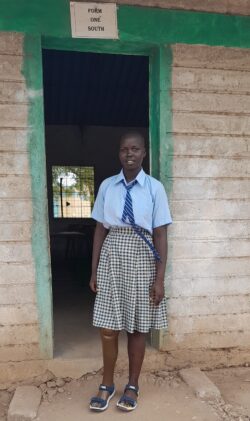Mainstreaming Disability Inclusion Through Cash Transfers
July 3, 2023 1:46 pmMany communities in Eastern Equatoria State in South Sudan view persons with disabilities negatively. In the past, little to no action has been taken to ensure that children with disabilities can go to school. Without challenging the stigma around disability and changing existing discriminatory practices, children with disabilities will continue to be excluded from classrooms.
There are 2,285 children with disabilities enrolled in primary and secondary schools in Eastern Equatoria State that is just 1.5% of the total number of children enrolled in the State. The World Health Organization estimate that in some countries, “being disabled more than doubles the chance of never enrolling in school” and an estimated one in three out-of-school children have a disability (Their World, 2022). We can therefore assume many more children with disabilities in Eastern Equatoria State are still out of school.

Alisha is a 19-year-old girl with a physical disability. “My leg was amputated a long time ago when I was young. I have been living with this condition since I joined my primary education.” Alisha was hit by a stray bullet during a tragic accident in the family home.
Like many young people with disabilities Alisha has faced numerous challenges just to go to school. After losing her father in 2013, she lives with her mother and four younger siblings. The family of six lives solely on the income of Alisha’s mother. Paying school fees and buying basic educational items is a huge challenge, not to mention Alisha’s additional needs due to her disability.
‘I was not able to meet my personal requirements because my [Mum] could not provide all that I need to be in the school, and my condition could not allow me to do activities to raise money to meet my school requirements,” Alisha told us.
The school environment was not conducive for Alisha – the bathrooms were not accessible and other children made fun of her, to the point where Alisha was ready to drop out of school. “I almost dropped out of school because I was lacking basic requirements and some of my friends were mocking me and giving me bad names like mulema, abu kereng (Juba Arabic slang that refers to a disabled person).”
Through the Girls’ Education South Sudan (GESS) cash transfer programme, Alisha has managed to buy a basin, a stool to use when showering or using the toilet, sanitary materials and books. Additionally, she can now afford breakfast at school and has also contributed towards family meals. These simple items can make the difference between a child dropping out of school or completing their education.
GESS cash transfers are direct payments made to girls enrolled in and regularly attending school. Cash transfers encourage girls to enroll in and attend school, help them to buy scholastic materials, and contribute to poverty reduction in the family and the community.
Young people with disabilities, especially girls, require greater resilience than their peers without disabilities to push ahead and complete their education. There are additional costs associated with disability such as assistive devices, rehabilitation, medication and transport to school, to name a few. Schools are not accessible, teaching and learning materials are not available and stigma and discrimination are prevalent.
GESS is training school management bodies on how to make their schools more inclusive for children with disabilities, as well as providing capitation grants to secondary schools to help improve the school environment. Some of this money will be used to support children with disabilities.
Although Alisha says her school is not adapted for learners with physical disabilities, the school does provide a guidance and counselling service for learners with disabilities. Alisha claims that this service has helped her to regain her confidence and encouraged her to complete her education.
Alisha is appealing for the GESS programme to continue and increase the cash transfer value so that all marginalized girls, including girls with disabilities, can be encouraged to enroll and remain in school until completion.
“I would like the school to build a good (accessible) entrance to the dormitory and the classes, and for GESS to add the amount of money to learners with disabilities, since they have many needs,” she concluded.
To read more about GESS’ cash transfers and disability inclusion activities, go to our website.
Categorised in: Cash Transfers, Girls' Education, Human Interest Story